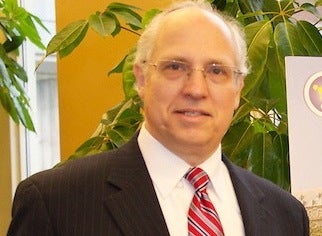A New Mission: Educating the Educators

Posted in GUMC Stories
 Aviad Haramati, PhD, would like to pose a very simple question to educators at Georgetown University Medical Center: “How many of you were hired for your teaching skills?” He predicts few hands would be raised. Haramati then would want to know: “How many of you want to make excellence and scholarship in teaching a focus of your work?”
Aviad Haramati, PhD, would like to pose a very simple question to educators at Georgetown University Medical Center: “How many of you were hired for your teaching skills?” He predicts few hands would be raised. Haramati then would want to know: “How many of you want to make excellence and scholarship in teaching a focus of your work?”
Haramati, a professor in the department of biochemistry and molecular & cellular biology, bets many more hands would be lifted and enthusiastically waved.
He wants to make it possible for the faculty at GUMC who are interested in innovating in the classroom and becoming educational scholars, to find the time, resources and opportunities to do so. “I want to help build a community of educators and create a culture of educational scholarship at the medical center,” says Haramati, who is also co-director of the graduate program in complementary and alternative medicine at the School of Medicine.
And Howard J. Federoff, MD, PhD, executive vice president for health sciences and executive dean of the medical school, is ready to facilitate these activities. Borne out of the GUMC-wide Strategic Planning Initiative, Haramati successfully proposed creation of a Center for Innovation and Leadership in Education (CENTILE), and was named its director. But CENTILE’s scope and priorities will be developed by GUMC educators themselves, he says. Later this spring, Haramati will invite up to 40 faculty — those teachers who waved their virtual hands — to a two-day, off-campus retreat to discuss their perspectives for how CENTILE can help advance the educational mission across all the schools at the medical center.
“The work of Dr. Haramati and CENTILE elevates the centrality of teaching at GUMC, perhaps for the first time,” Dr. Federoff says. “Historically, excellence in education was not necessarily recognized, and I’m hopeful this work will inspire future generations of faculty members at GUMC to embrace teaching excellence. It’s simply the right thing to do.”
Faculty not hired for “teaching expertise”
“When it comes to the educational mission at GUMC, most of the faculty who teach at the medical center were recruited to do something else — conduct research or engage in clinical activities. Indeed, few if any have formal training in education,” says Haramati. “However, quite a few have expressed the desire to take professional development courses in education, attend national and international educational conferences and have the opportunity to conduct education research and become educational scholars.
“The goal of CENTILE is to create a culture of educational scholarship at the medical center,” Haramati says. He adds that more and more universities, medical centers in particular, are recognizing the need to make education a professional focus.
“We need to leverage the expertise that currently exists at GUMC. We can create a community of educators across departments and schools at the Medical Center and launch new programs and initiatives to foster scholarship and innovation in health professions education.
“We all are tasked with doing three things at GUMC — research, service and teaching — and the goal now is to support faculty as they develop that educational component,” Haramati says.
First love is teaching
Haramati, who has been at Georgetown since 1985, understands why scholarship in education falls between the proverbial cracks in a busy medical center.
He never considered education one of his core activities until, in 1992, he was sent by the medical school dean to a week-long meeting at Harvard University “that I had no interest in attending.”
The conference focused on Harvard’s new curriculum and “I was not interested in hearing how wonderful Harvard administrators and faculty felt about their new approach. What I found instead was humbling: a dean and associate dean who were concerned about how to train the physicians of the future, but reaching out to the community-at-large (including looking beyond Harvard) to help them figure out how best to move forward,” he says.
“I learned about the value of professional educators and how they can inform the science faculty, who were subject experts. I also heard about cognitive neuroscience and how the science of learning could provide a conceptual framework for approaching curricular reform and the science of instruction.”
Haramati brought back ideas that were implemented in the mid-90s at Georgetown. By 1997, he was spending at least half his time on education. He helped create the International Association of Medical Science Educators (www.iamse.org) and served as its first president. The guiding principle of the group, which now has members from more than 40 countries, is that all who teach sciences fundamental to medical practice should have access to the most current information and skills needed to excel as educators.
Haramati has concluded that “his first love is teaching,” a passion recognized with nine Golden Apple awards from medical and graduate students at Georgetown. In 2004, Haramati was selected by faculty and alumni for induction into the Magis Society of Master Teachers at Georgetown. He has also received numerous national teaching awards, including the Alpha Omega Alpha Robert J. Glaser Distinguished Teaching Award from the Association of American Medical Colleges, but the ones that mean the most to him come from the campus he loves.
“Effective teaching is an essential part of what makes a great medical school,” Haramati says. “I care deeply about helping faculty succeed in that role.”
By Renee Twombly, GUMC Communications
